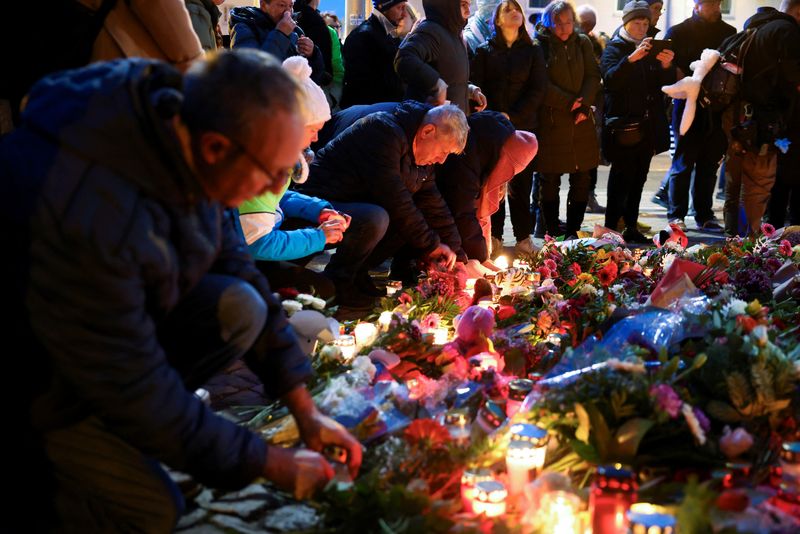By Thomas Escritt
MAGDEBURG, Germany (Reuters) – A spontaneous memorial created by grieving families and local residents at a church overlooking Magdeburg’s Christmas market evolved during Saturday into something more politically charged.
The changing tone at the site of a car-ramming attack on Friday in which five people were killed and more than 200 injured reflected political tensions in a country racked by arguments over immigration and over the surging popularity of the far-right Alternative for Germany (AfD).
Authorities arrested a Saudi man with a history of anti-Islamic rhetoric but said the motives for the attack were not yet known.
At first, as people laid flowers outside the church in the early morning, there were just expressions of sorrow and grief.
Andrea Reis, 57, arrived with her daughter Julia, 34, and reflected on a narrow escape.
It was only because her daughter wanted them to keep walking round the market rather than stop to eat that they were not in the path of the car that ploughed through the market, she said.
“It was the terrible sounds, children calling ‘mama, papa,’, ‘help me’ – they’re going round in my head now,” Reis said, a tear trickling down her cheek.
Another young woman sobbed, bent double with grief as an older couple embraced her.
Initially, the attack drew comparisons on social media to an Islamist-influenced immigrant’s deadly attack on a Berlin Christmas market in 2016.
Later it emerged that the suspect, a psychiatrist who had lived in Germany for 18 years, had criticised Islam and expressed sympathy for the far right in past social media posts. This prompted damage control by the far right.
Martin Sellner, an Austrian popular with Germany’s far-right, posted on social media that the suspect’s motives “seemed to have been complex”, adding that the suspect “hated Islam, but he hated the Germans more”.
As the day passed, politicians, including Chancellor Olaf Scholz, came to lay flowers at the spontaneous memorial.
By the time Tino Chrupalla, the AfD’s co-leader, came, the crowd was filled with young people who had responded from all round east Germany to calls by the party’s youth wing on social media to attend a vigil.
The party, particularly strong in eastern Germany, came first or second in three regional votes this autumn, and hopes for more success in a national election in February.
Many of the gathered supporters wore symbols associated with neopaganism and other mystical movements associated with the far right.
One young man, who said he was from the AfD’s youth wing, wore an amulet depicting the hammer of the Norse god Thor.
“I’m a believer in the old gods,” he said, declining to give his name.

Interior Minister Nancy Faeser expressed concern that the attack could be exploited by the far right, but said little could be done to prevent seemingly coordinated gatherings.
“We have freedom of assembly in this country,” she said, touring the scene of the attack. “We have to do everything possible to make sure the attack isn’t misused by either side.”
#grief #political #tone #site #Germany #Christmas #market #attack #Reuters